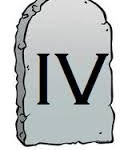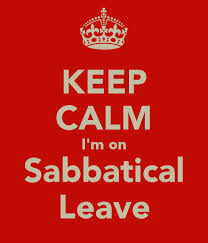If multitasking is the enemy of reverence, which I’m quite sure it is, then I’m in trouble. Me, a week ago
 And on the seventh day God rested. According to the Hebrew Scriptures, God’s decision to take a day off after six days of hard work was intended to serve as a model for how human beings should structure their lives. If the Big Guy thought it a good idea to take a break from the usual “creating the heavens and the earth” grind, then perhaps mere mortals should also schedule regular breaks from their usual routines. Hence the Fourth Commandment:
And on the seventh day God rested. According to the Hebrew Scriptures, God’s decision to take a day off after six days of hard work was intended to serve as a model for how human beings should structure their lives. If the Big Guy thought it a good idea to take a break from the usual “creating the heavens and the earth” grind, then perhaps mere mortals should also schedule regular breaks from their usual routines. Hence the Fourth Commandment:
 Remember the Sabbath day, to keep it holy. Six days you shall labor and do all your work, but the seventh day is the Sabbath of the LORD your God. . . . For in six days the LORD made the heavens and the earth, the sea, and all that is in them, and rested the seventh day. Therefore the LORD blessed the Sabbath day and hallowed it.
Remember the Sabbath day, to keep it holy. Six days you shall labor and do all your work, but the seventh day is the Sabbath of the LORD your God. . . . For in six days the LORD made the heavens and the earth, the sea, and all that is in them, and rested the seventh day. Therefore the LORD blessed the Sabbath day and hallowed it.
To which the general contemporary American attitude is “Whatever.” You can’t run a business or a career that way—it’s not clear that a modern life can be lived that way either.
But I’ve had the first cousin of the Sabbath—sabbatical—on my radar screen for a while. The early books of the Hebrew Scriptures have a lot to say about how the newly liberated children of Israel are to organize their communities once the Promised Land is occupied and the pesky inhabitants are killed or thrown out.  On a once-every-seventh-year rotating basis, slaves are to be set free, fields are to be left fallow, debts are to be forgiven—behold, all things are become new. The Sabbath/sabbatical idea incorporates some sort of divine insight into how things work; fortunately, in my profession the opportunity for sabbatical is still available for the fortunate few. And I am one of them—my third sabbatical, the first one to last a full year, will begin on July 1. To my non-academic friends and family who believe that I will be on a year-long vacation doing nothing, I respond that sabbatical is not about doing nothing. It is definitely about doing different things, but even more is about doing things differently. And so, I suspect, is the core Sabbath idea. The point is not to stop doing things one day out of seven. The point rather is to include in my life a structured reminder to see, think, and act differently than usual. Doing that on a weekly basis is far more challenging than planning for a once-every-seven-years extended sabbatical.
On a once-every-seventh-year rotating basis, slaves are to be set free, fields are to be left fallow, debts are to be forgiven—behold, all things are become new. The Sabbath/sabbatical idea incorporates some sort of divine insight into how things work; fortunately, in my profession the opportunity for sabbatical is still available for the fortunate few. And I am one of them—my third sabbatical, the first one to last a full year, will begin on July 1. To my non-academic friends and family who believe that I will be on a year-long vacation doing nothing, I respond that sabbatical is not about doing nothing. It is definitely about doing different things, but even more is about doing things differently. And so, I suspect, is the core Sabbath idea. The point is not to stop doing things one day out of seven. The point rather is to include in my life a structured reminder to see, think, and act differently than usual. Doing that on a weekly basis is far more challenging than planning for a once-every-seven-years extended sabbatical.
In last Monday’s blog post I revealed that my one New Year’s resolution is to be a more reverent person in 2015:
Freelance Christianity: One Thing
I’m sure that this decision is a confluence of thinking about sabbatical and reading  Barbara Brown Taylor’s An Altar in the World in which she writes engagingly about how important taking a true Sabbath every week has been to her in the years since she stepped down from the manic energies required by being the rector of a thriving Episcopal parish. As I thought about what reverence might mean outside the confines of its usual religious implications—what “secular reverence” might be, if you will—I kept circling back to a negative definition: Reverence is the opposite of multitasking. If being reverent means paying careful attention to the tasks, persons and items in my life as they show themselves, it also means not dividing that attention fifteen different ways.
Barbara Brown Taylor’s An Altar in the World in which she writes engagingly about how important taking a true Sabbath every week has been to her in the years since she stepped down from the manic energies required by being the rector of a thriving Episcopal parish. As I thought about what reverence might mean outside the confines of its usual religious implications—what “secular reverence” might be, if you will—I kept circling back to a negative definition: Reverence is the opposite of multitasking. If being reverent means paying careful attention to the tasks, persons and items in my life as they show themselves, it also means not dividing that attention fifteen different ways.
As I sat in our lovely little library room before dawn last Saturday morning, the first morning after choosing reverence as the focus of my one New Year’s resolution, I wondered “What is the thing most likely to suck me into multitasking?” The answer was obvious—my greatest temptation to non-reverence was (and is) my beloved  Surface II tablet, recharged and waiting for my use, laying on the bottom shelf of the table next to my chair. And I had a “What If?” moment. What if I tried to spend twenty-four hours without turning my tablet (or either of the other laptops in the house) on? What if I deliberately removed the greatest temptation to multitask and lived in a “tablet-free” zone for twenty-four hours? What if, in other words, Saturday January 3, 2015 was a “Computer Sabbatical”?
Surface II tablet, recharged and waiting for my use, laying on the bottom shelf of the table next to my chair. And I had a “What If?” moment. What if I tried to spend twenty-four hours without turning my tablet (or either of the other laptops in the house) on? What if I deliberately removed the greatest temptation to multitask and lived in a “tablet-free” zone for twenty-four hours? What if, in other words, Saturday January 3, 2015 was a “Computer Sabbatical”?
Immediately a swarm of questions and concerns swept over me like locusts over Egypt.
- But what if I want to work on some essays today?
- What if an answer to one or more of the cosmically important emails I sent out yesterday comes in today?
- How am I going to be able to track how my blog numbers are doing?
- I was going to finish the syllabus for my upcoming Philosophy of the Human Person class today.
- Should I tell Jeanne what I’m doing?
- Would using my cell phone count as a violation of computer sabbatical?
- How am I going to print off the essay I wrote yesterday that I’ll be using at Living Stones seminar tomorrow after church?
- Most importantly, how am I going to find out when the Friars game this afternoon is?
As the above concerns flooded into my awareness (all within five minutes of my declaring the day “computer free”), I scribbled them down in a yellow pad of paper. Which immediately answered concerns 1 and 4 above—there is a remarkable invention, almost as amazing as tablets, called “paper” upon which one can record one’s most profound thoughts even when no computer is available. I did indeed write a new essay last Saturday; I dutifully typed it into my tablet on Sunday. I also finished off a few syllabus-related items in long hand. I had forgotten how horrible my handwriting is.
I’m not sure how #5 ever came up, since the sight of me without my tablet surgically attached everywhere I go would have alerted Jeanne that something was up. I did tell her what I was up to as soon as she arose because I needed her wisdom concerning #6.  Does my computer sabbatical apply to my phone (which isn’t technically a computer after all)? “Yes it does apply,” she immediately said, “since you use your phone like a computer instead of a phone.” True enough. I hate getting phone calls, but love checking my emails and blog numbers on my phone. Which focused my attention on #2 and #3. On Sunday morning I found out that although about twenty-five emails came in on Saturday, none of them were the responses I was looking for; I deleted all but two of the twenty-five without even reading them. Which tells me, I guess, that perhaps the emails I sent weren’t cosmically important after all.
Does my computer sabbatical apply to my phone (which isn’t technically a computer after all)? “Yes it does apply,” she immediately said, “since you use your phone like a computer instead of a phone.” True enough. I hate getting phone calls, but love checking my emails and blog numbers on my phone. Which focused my attention on #2 and #3. On Sunday morning I found out that although about twenty-five emails came in on Saturday, none of them were the responses I was looking for; I deleted all but two of the twenty-five without even reading them. Which tells me, I guess, that perhaps the emails I sent weren’t cosmically important after all.
As for checking my blog numbers, this was a big problem. I had no idea how often I do this habitually until computer sabbatical day. I have taught logic classes before and know all about the  “post hoc, ergo propter hoc” (“after this, therefore because of this”) fallacy, but I have been convinced for a long time that the number of visits to my blog during a given day is directly proportional to the number of times I check my blog numbers. And guess what? Computer sabbatical day proved my theory to be correct. Last Saturday was my worst blog activity day in close to a year—obviously because I didn’t check the numbers all day. By the way, I found out when the Friars game was when I remembered I had a calendar in my backpack with all of the college sports events for the year listed by day and time. I shouldn’t have bothered. They lost.
“post hoc, ergo propter hoc” (“after this, therefore because of this”) fallacy, but I have been convinced for a long time that the number of visits to my blog during a given day is directly proportional to the number of times I check my blog numbers. And guess what? Computer sabbatical day proved my theory to be correct. Last Saturday was my worst blog activity day in close to a year—obviously because I didn’t check the numbers all day. By the way, I found out when the Friars game was when I remembered I had a calendar in my backpack with all of the college sports events for the year listed by day and time. I shouldn’t have bothered. They lost.
I did make it through the day without turning a computer on or messing with my phone. Instead I took down the Christmas tree, wrote a new essay, finished An Altar in the World, listened to the Friars lose on the radio, watched a bunch of TV (only some of it worth watching), ate more than usual, and sort of felt like I didn’t get that much done in the day. But the evidence of baby steps in reverence was there. For instance, I am in the habit of noting in the index the chapters of any book I am reading that I especially like or find insightful. Was it a coincidence that three of my four favorite chapters in  An Altar in the World are chapters that I read without tablet interruption on Saturday morning? And when Jeanne told me early in the evening on Saturday that I looked “extremely content” sitting in my chair in the living room, I concluded that maybe the computer sabbatical experiment is worth repeating every Saturday for the foreseeable future. As regular “no computer” days become habitual, I hope to notice that at least once a week less multitasking means more reverence. And as to #7 above: I did not have print off a hard copy of my new essay for Living Stones on Sunday morning after all. I just brought my tablet to church and read it off the screen.
An Altar in the World are chapters that I read without tablet interruption on Saturday morning? And when Jeanne told me early in the evening on Saturday that I looked “extremely content” sitting in my chair in the living room, I concluded that maybe the computer sabbatical experiment is worth repeating every Saturday for the foreseeable future. As regular “no computer” days become habitual, I hope to notice that at least once a week less multitasking means more reverence. And as to #7 above: I did not have print off a hard copy of my new essay for Living Stones on Sunday morning after all. I just brought my tablet to church and read it off the screen.












